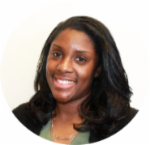Provider Perspective: Camesha Thompson
For healthcare providers, the passion for enacting meaningful change can come from a number of factors, but for many, this drive originates directly from their own environment.

Camesha “Cam” Thompson, an Infectious Disease Registered Nurse Care Coordinator at CCI Health & Wellness, entered the field inspired by the experiences of her own family, along with those of other people who look like her. Aiming to make a positive difference in the lives of marginalized individuals, Cam Thompson is a premier example of a provider who works to make the state of Maryland alive.
Read below to learn about her passion for this work, some of the major takeaways that she has gained so far throughout her career, and the rewarding impact she has on her patients.
What inspired you to enter this field?
“I’ve always been into science. And it’s so weird because I was the one that was scared of germs and ‘icky things’ growing up, but that fear kind of bred into fascination for it.
And then also, just given where I’ve grown up and all of the different socioeconomic things, especially within my family, I noticed a lot of things regarding substance use and infectious disease and how a lot of these things kind of go hand in hand. The fascination grew with it and I always knew at some point I would want to work more exclusively with infectious disease, given that, um, I’ve had the pleasure of serving on a community health level. And we see a lot of people that look like me and a lot of people that look like my family members and things like that.
I always felt like when I got the opportunity to do something about it, I wanted to just jump in– you know, grassroots.”
What impact do you intend to have?
“My intended impact is to do the most good, whether that’s helping to eradicate a virus or whether that’s just connecting someone to care, whether that’s letting someone know, ‘Hey, this is what your life will look like going for, but you’re not alone.’ My impact is just to be present, especially amongst people who might be marginalized, disenfranchised, or just don’t know where to start. Hopefully, I could be that starting point for them.”
What is a common misconception surrounding your work?
“There are so many with infectious disease, more exclusively HIV stigma. Being human with our ability to try and figure out things and get a handle on things, we create these constructs. Most times, constructs come from implicit bias because you just don’t know what you don’t know. And so the hard part about this type of work is trying to get people to understand that HIV is holistic.
Everybody does not acquire it by way of what people expect; it is not always a sexually acquired type of thing, especially across the diaspora. It could be breastfeeding. It could be by other means that weren’t even up to the person who acquired said disease. And so the hard part is trying to open people’s eyes to understand everything you thought you knew about HIV. Ask questions, read books, but please don’t label it because it looks like anyone.
What has been of the biggest takeaways that you have gotten since entering this field?
“One of the biggest takeaways– and it’s something that really breaks my heart– I did not realize how heavy human trafficking is. I mean, in your mind, you just put it in certain areas, but you don’t realize that at the grocery store you frequent it’s happening, at the movie theater it’s happening, at the school it’s happening.
And so obviously as a clinician, but also as a parent, it’s terrifying to know that these things are right next door to you. And so part of the fear of learning about those things, it still kind of fuels and helps my drive to know and make myself more effective in terms of trying to help. A good bulk of our job is community outreach – how can I effectively do outreach and go out to the people and give them what they need if I don’t know what’s going on?
So it’s bittersweet. You have to know what you’re contending with when you help people. And some things you just don’t really want to know, but if you know, then you can be more effective and you can help. So that’s, that’s been the hardest part of all of this for me.”
What do you hope to see in the future?
“The more ideal, more optimistic is ending the AIDS epidemic or HIV epidemic. That’s the goal. But in the short term, I hope for people to understand that it’s not a [hierarchy], it’s not [primary healthcare] on this side and then HIV. I want people to understand that and respect that is holistic. I want people to feel comfortable and feel safe with their diagnosis and not feel that it puts a target on them living with it. I want it to be as safe to talk about HIV as it is for diabetes, hypertension, high cholesterol. I don’t want people to feel ostracized.
I’ve really been blessed to work in the community health sector. It’s really hands-on being out here with the people and I’m extremely blessed and grateful to be with CCI Health Services to do what we do on a very broad level. Our individual program is going to expand soon. So we’ll live in both [Montgomery and Prince George’s] counties to be able to provide more care. So I am amped about that.”
Do you know a Maryland-based provider who we should highlight? Email Alive! Maryland at info@alivemaryland.org with recommendations.
